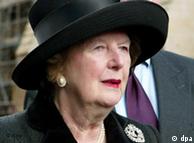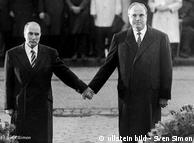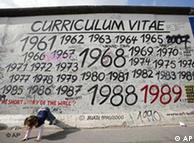 Author
Author
|
Topic: Germany's neighbors try to redeem their 1989 negativity (Read 1057 times) |
|
Fritz
Archon
    
Gender: 
Posts: 1746
Reputation: 8.47
Rate Fritz

  
|
 |
Germany's neighbors try to redeem their 1989 negativity
« on: 2009-11-09 08:27:10 » |
 |
Since we are about Memes, this old nut just keeps on getting under foot and in light of the 20th anniversary of the fall of the Berlin Wall I thought worth pandering to. I am still amazed at the unwillingness of the European collective to take ownership of history. But then I am just a bitter old man.
Cheers
Fritz
Source: Deutche Welle
Date: 2009.11.08
Author: Ben Knight
Editor: Rob Mudge
The recent reopening of archives from 1989 has revealed embarrassing bigotry in some former European leaders. The release of the secret files to coincide with anniversary celebrations is meant as a kind of redemption.
Germans have often noted British tourists' World War II obsession with a mixture of bemusement and dismay. But recent revelations have shown that this preoccupation, usually expressed in the un-threatening confines of comedy, was also the British prime minister's deep personal phobia at the time of Germany's reunification.

Margaret Thatcher was openly hostile to the reunification of Germany
While USA and, surprisingly, the Soviet Union, largely welcomed the moment of redemption and euphoria that ushered in the end of a black century, Germany's non-superpower neighbors were prey to old fears.
"It is still an uncomfortable thought," Professor Paul Nolte, who teaches history at the Free University in Berlin, told Deutsche Welle, "That something that Germans were so happy about, and that unified Europe, could have been rejected by our closest partners. We ask ourselves, 'How could anyone have been against it?' "
At the end of October this year, France followed Britain in releasing its foreign policy archives from 1989 and 1990 in the run-up to the reunification of Germany. Although the files will not precipitate a major reassessment of history, they illustrate the depth of fear among western leaders who were publicly celebrating the victory of democratic freedom over communism.
'Capable of anything'
In a telegram found in the French archives and dated March 13, 1990, Prime Minister Margaret Thatcher is quoted by the French ambassador in London describing Chancellor Helmut Kohl as being "capable of anything. He has become a different man. He does not know who he is anymore. He sees himself as the master and is starting to act like it."
The lack of empathy between Kohl and Thatcher is well-documented - for his part, Kohl once remarked that he feared the British leader as "the devil fears holy water" - nor is there much of a secret around Thatcher's hostility to reunification, which her memoirs had already made clear.
In a more sober moment, Thatcher told Mikhail Gorbachev, "Britain and western Europe are not interested in the unification of Germany. The words written in the NATO communiqué may sound different, but disregard them. We do not want the unification of Germany."
The files newly released by the British Foreign Office do little more than confirm the German image of Thatcher. "This doesn't change the total picture much," says Andreas Roedder, a professor at the University of Mainz who published a book on reunification this year, "But the details fill it out."
On the other hand, Nolte was surprised by the skepticism that French president Francois Mitterrand apparently had toward German reunification. "That's the biggest revelation from my point of view," he told Deutsche Welle.

Helmut Kohl and Francois Mitterand holding handsBildunterschrift: Even Francois Mitterand, left, harbored misgivings about having a new, unified neighbor
Wary France
The speed with which Germany under Kohl moved toward reunification seems to have taken Europe's leaders by surprise. In October 1989 an analysis of the "German question" by the French Foreign Ministry judged that reunification "does not appear realistic at this moment."
In a letter dated Nov. 24, 1989 from Mitterrand to East German leader Egon Krenz, the French president talked of "perspectives of development in relations with the German Democratic Republic and the European Community." Four days later Kohl introduced his 10-point unification plan to the world.
By presenting this program, the normally wary Kohl shrewdly seized the initiative both at home, where the opposition Social Democrats were threatening to steal the issue from him, and abroad. Among the 244 newly released Foreign Office documents, British ambassador in Bonn Sir Christopher Mallaby summed up its significance on the same day.
"The key point is that the pressures have reached a level where Kohl has felt obliged to make a high profile statement of a policy expressly intended to lead in time to German unity," he wrote to the British government, "And he has done so on his own authority, not on behalf of the whole coalition, and without prior consultation with the Allies … It shows how fast the German question is moving." In response, Thatcher remarked, "Christopher Mallaby seems to welcome reunification."
The Allies face 'the German question'
Mallaby's use of the word "Allies" shows how dominant the consciousness of World War II still was in 1989. The Allied military presence in respective sectors gave West Berlin the feel of an occupied zone well into the 1980's. "Western soldiers were customers in shops, in hairdressers. They were part of everyday life," reminds Nolte.
The East Side Gallery of the Berlin WallBildunterschrift: Großansicht des Bildes mit der Bildunterschrift: Reunification was not only a domestic problem

"It was not just a German problem - something that was split up that had to be reunified - but the whole history of World War II hung over it. The international legal situation still had to be cleared up, as the Two-Plus-Four negotiations of 1990 showed," Nolte says. The Two-Plus-Four agreement, signed in Moscow in September 1990 between the two Germanys and the four occupying powers, sealed the final international acceptance of reunification.
Before then, a veritable tug-of-war developed between Thatcher and her representatives. Diplomats like ambassador Mallaby were eager to put Britain in a more favorable position once something that now seemed inevitable was accomplished.
The new files show Thatcher's Foreign Secretary Douglas Hurd giving her some blunt advice in a meeting January 1990. "If the people of the Federal Republic of Germany and the German Democratic Republic decide freely and democratically in favor of unity, there is no way of stopping that, short of military action," he told her.

The timing of the release of such documents - a full decade before British law required it - shows that the British Foreign Office apparently felt that its diplomatic reputation needed a little rehabilitation.
This is somewhat surprising to Roedder. "The British and the French apparently have a significant need to explain themselves. I don't really understand it," he told Deutsche Welle. "I can see that the British and French governments, in a new unified Europe, see their own attitudes in a bad light. It's also curious that the French are celebrating the 20th anniversary on the Champs-Élysées. But the fact that a lot of British and French people weren't exactly overjoyed at the thought of a reunified Germany, is completely understandable. It changed the power balance in Europe."
Twin fears
Thatcher had two main fears that were feeding each other in the fraught year between the fall of the Berlin Wall and reunification - a united Germany would be able to strengthen the European Community, and a stronger EC would in turn increase Germany's power. Thatcher's position was in fact not far from the more hysterical right-wing body of opinion in Britain, expressed by backbench MPs, that Germany planned to use the European Community to dominate the continent.
Berliners sing and dance on top of the Berlin Wall in 1989Bildunterschrift: Großansicht des Bildes mit der Bildunterschrift: "How could anyone have been against it?"
While she aired her suspicions publicly, Mitterand kept his misgivings private. The French president was committed to the European project, and in exchange for his blessing for a unified Germany, was able to extract from Kohl his commitment to European Economic and Monetary Union. This was exactly what Thatcher feared. "The problems will not be overcome by strengthening the EC. Germany’s ambitions would then become the dominant and active factor," Thatcher was quoted as saying in February 1990.
The result was that Britain's diplomacy became crippled in Europe and elsewhere. The German press seized on Britain's perceived negativity and magnified it, until it damaged Britain's relationship with the US, a nation that remained enthusiastic about reunification throughout.
The fears of Foreign Office official Sir John Fretwell, expressed with some foresight late in 1989, came true: "If we tried to stand against this tide, we should enter into fundamental political conflict with the Federal Republic of Germany and with many of our allies, including the United States." If Britain did not begin to convey the impression that it shared the vision of a united Europe, he said later, the Germans "will be tempted increasingly to move ahead without us on these fundamental issues of European policy."
When Thatcher was finally brought down by her own party, in part because of her recalcitrance on European policy, the significance was not lost on those Germans.
|
Where there is the necessary technical skill to move mountains, there is no need for the faith that moves mountains -anon-
|
|
|
Fritz
Archon
    
Gender: 
Posts: 1746
Reputation: 8.47
Rate Fritz

  
|
 |
Re:Germany's neighbors try to redeem their 1989 negativity
« Reply #1 on: 2009-11-12 14:51:21 » |
 |
From the Author of Stalingrad
Cheers
Fritz
Antony Beevor's new history of D-Day reveals the flip side of the massive invasion: the ‘cruel martyrdom' of Normandy
Source: Globe and Mail
Author: David Stafford
Date: 2009.11.07

The D-Day landings in Normandy on June 6, 1944, changed the course of the Second World War. The largest seaborne assault ever attempted, it landed 130,000 men on the shores of Hitler's Europe in just 24 hours and heralded the liberation of Western Europe.
Yet it could easily have been a catastrophe. The margin between defeat and victory was perilously thin, and had the Allies failed, it would not just have been a bloodbath but a tragedy for the peoples of Europe. No new invasion could have been attempted for at least another year, condemning them to endless months more of Nazi rule and SS terror. Paris, Brussels, Copenhagen and other Western capitals would likely have been liberated by Stalin's Red Army instead of by Eisenhower's forces. The whole of Germany, instead of its largely impoverished eastern half, would have become part of the Soviet Empire. The Cold War's iron curtain would have followed the banks of the Rhine rather than those of the Elbe.
Yet, thanks to meticulous planning and execution, D-Day was a brilliant success. Within weeks, the Free French leader General Charles de Gaulle was walking down the Champs-Élysées in Paris amid wild jubilation. In September, Brussels witnessed similar scenes, and a month later Allied troops captured Aachen, the first German city to fall into their hands.
No wonder that for decades historians have pored over D-Day, describing the battles, recounted the exploits of individual divisions, corps, regiments, battalions and platoons, analyzed the leadership of generals, debated Allied and German tactics and strategy, and endlessly refought the Normandy campaign with all the bountiful benefit of hindsight. The recent 60th anniversary of D-Day in 2004 saw a veritable tidal wave of books on the topic.
So it seems odd to write yet another book on the subject so soon. Antony Beevor, who made his name with a surprise bestseller on the battle of Stalingrad, is a military historian and former commissioned officer in the British army. Combined with his ability to write well and fluently, the magic of his Stalingrad book and its successor on the battle for Berlin was to weave strategic and tactical details with the experiences and memories of individual participants from generals to foot soldiers. This gave his narrative a refreshing human perspective that broke with the mould of most traditional military history. What made them especially successful, however, was that they provided the first really accessible popular accounts for a Western readership of the Eastern Front campaign.
“ Beevor reminds us that in Normandy almost 20,000 French civilians were killed during the campaign ”
Endlessly written about in the West, however, D-Day and the Normandy campaign are a different matter. Inevitably, there is a powerful sense of déjà vu about Beevor's tale, and despite all his best efforts, his book will mostly be enjoyed by those who like the minutiae of military campaigns. He is keen to remind us even before he begins of the difference in size between British and Canadian regiments on the one hand and U.S. and German regiments on the other. The almost 600 pages that follow tell us a great deal more of this kind.
Happily, however, his judgments are broad, and give no quarter. Above all, he is scathing about Montgomery's preposterous assertions that all in Normandy had gone to plan, his diplomatically disastrous bad-mouthing of his U.S. allies, and his alienation of the higher ranks of the Royal Air Force. In general, Beevor shows, the allies gravely underestimated the tenacity and discipline of Hitler's thoroughly indoctrinated troops. D-Day was a triumph. What followed was a dreadful battle of attrition. No one can be in doubt about the reason why after reading his account.
But the real merit of the book lies less in the detail than in two major points. For all his success in bringing home to Western readers the heroism of the Red Army, Beevor is refreshingly clear-eyed about the nature of the Soviet Union. For years after the war, Soviet propagandists sneered at D-Day and the Normandy campaign as a mere sideshow. It was on the Eastern Front, they insisted, that the real fighting took place and where Hitler was truly defeated. This is a refrain still echoed by some Western historians, as well.
Yet, as the author shows, the battle of Normandy was comparable in its intensity to the fighting on the Eastern Front. During the three summer months of 1944, the Wehrmacht suffered nearly a quarter of a million casualties and lost another 200,000 men to Allied captivity, a rate of 2,300 men per division per month, which was higher than in the East. The Western allies sustained more than 200,000 casualties. The fighting was savage, and on both sides the killing of prisoners was much greater than generally recognized.
Yet of the casualties, the truly revealing story here is that of French civilians. Visits to the military cemeteries of Normandy, with their rows of crosses marking the final resting places of thousands of young men at the dawn of their manhood, are moving experiences. But they misleadingly tell only part of the story. For missing in these shrines are the graves of the thousands of civilians killed in the liberation of France.
Military historians too often forget that the battles they describe involve others than soldiers. Beevor reminds us that in Normandy almost 20,000 French civilians were killed during the campaign and a much larger number seriously wounded – and all this was on top of the 15,000 French citizens killed by the preparatory bombing. “It is a sobering thought,” he writes, “that 70,000 French civilians were killed by Allied action during the course of the war, a figure which exceeds the total number of British killed by German bombing.”
The flip side of the liberation was what he calls the “cruel martyrdom” of Normandy. Caen, its capital, was devastated by Allied bombing. Beevor thinks that this was stupid, counterproductive and close to a war crime. Perhaps so. But he also tells us that the Gestapo deliberately and systematically shot to death all its political prisoners in Caen on the day of the landings. Whatever their faults, such crimes against humanity were not on the Allied agenda.
All history, it has been said, is contemporary history, meaning that historians inevitably reflect the times in which they write. With Beevor's emphasis on the civilian as well as the military costs of liberation, and of the wreckage delivered to France's infrastructure, there are powerful echoes here of the war in Iraq. Perhaps, after all, another book on D-Day is not out of place.
|
Where there is the necessary technical skill to move mountains, there is no need for the faith that moves mountains -anon-
|
|
|
|




